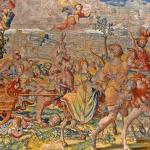
It’s not what you know, but what you do which is important. Studying and learning about the truth can be good, but what use is it if it you do not put it into action? Knowing how to determine what is best to do is not the same thing as doing it. Those who naturally do what is just, even if they do not know all the reasons which could be used to prove the goodness of such actions, are far better off than those who can and do argue about morality but end up doing nothing, or worse, becoming hypocrites and do the opposite of what they know they should do. It is not those who study or learn or listen to those who do who will be seen as just, but those who do what should be done: “For it is not the hearers of the law who are righteous before God, but the doers of the law who will be justified” (Rom 2:13 RSV).
Knowing the law, knowing and understanding and sharing its dictates in a just and pastoral manner, is good. Knowing theological truths and sharing them with others is also good. For, clearly, it is better to know and understand why things are as they are than not knowing such things. Knowledge is a good, and sharing that knowledge with others is therefore, a good thing to do. But it is a good which can and will only go so far. Much more is expected of us than simply knowing what is good or true. Just as actions speak louder than words, so acting upon the truth is greater than sitting around doing nothing once it is known. Quietism was wrong in suggesting that our actions are unimportant, that it is better for us to sit around contemplating the truth, engaging in mystical experiences, than it is to take all that is gained in and through such experiences and use them in our engagements with the world.
Those who know more, those who have been given more, have more, not less expectations placed upon them. Those who have been given special revelations, like the Jews did with the Law of Moses, could be and should be made greater through them. The people of Israel were chosen to be special representatives of God for the whole world, and many, throughout history, have taken the grace and insight they have been given, and honored God well with their lives, accomplishing what God wanted from them. They fulfilled God’s expectations for them, which is why we can and should honor them and the Law which helped inspire them.
We should not assume that those who have not been given the same level of insight or grace will be judged the same way with those who have, because they will not. They will be judged according to what they have been given, and not on what they could not and did not know or have. For as those who have been given more have that much more expected of them, those who have been given less, will have less expected to them. It would not be just to expect a person who could never know something to be condemned because they did not know it, but on the other hand, it would be just to deal with people based upon what they know, and how they realized the truth of what they knew. This is why Paul could and would talk about the Gentiles having their own revelation, that of the conscience, by which they will be judged by God:
When Gentiles who have not the law do by nature what the law requires, they are a law to themselves, even though they do not have the law. They show that what the law requires is written on their hearts, while their conscience also bears witness and their conflicting thoughts accuse or perhaps excuse them on that day when, according to my gospel, God judges the secrets of men by Christ Jesus (Rom. 2:14-16 RSV).
On the one hand, Paul found a way to promote righteous Gentiles, showing how and why, even if they did not have the gifts the people of Israel did, they could and should be affirmed for what they did know and do as a result of their knowledge. On the other hand, Paul did not want us to deny the value of the people of Israel in history, nor the special revelation they were given. His discussion of the law and grace was not meant to have people think there was something bad about the law, that it would have been better for Israel not to have it. He affirmed the special value of the people of Israel and the Law of Moses, and that they were set aside for a great mission in the world. But he wanted his readers to understand that God is a God over all, and God has always had ways to interact with others. No one, no matter how much they have been given, has perfectly realized the truth which they received, so that everyone has fallen short and needs grace. Those who are open to the truth, who struggle to follow it and do what they know is right and just, will find grace will perfect them, leading to their salvation. Those who struggle against it, those who do not care to follow it, risk losing everything. This is not to say they cannot change their ways, repent, and so be saved, for they can, but it is clear, everyone will be judged based upon how they cooperated with the truth they knew and understood.
Paul wanted Christians to realize that God would not expect people to follow that which they could not and did not know, and this, of course, is something Christians should always consider when dealing with non-Christians. That is, what Paul said in the first century should be seen as applying to the world today. Christians have been given much, and so, through the grace and revelation they have received, much is expected of them. Those who are not Christian, those who do not know or understand the revelation of God given to the world in and through Jesus Christ, will be judged by what they do know and understand. “For God shows no partiality” (Rom. 2:11 RSV). Those Christians, therefore, who will neglect, or fight against, the way they are expected to love their neighbor, to do good to those in need, such as the poor, the oppressed, the foreigner seeking a better life for themselves, and the like, are going to come face to face with Jesus, and he will ask them why they ignored him as he was found in those people they neglected or worse, rejected. Similarly, non-Christians who honor and respect those in need, helping them the best they can, will find that despite their lack of knowledge of the Gospel, they have done what is right and just, and will be welcomed by Jesus for the love which they have shown. For it is not just about being Christian, about knowing the true faith, nor about being able to recite all the intricate details of the faith, but doing what the faith expects of us which is important. If we think our actions are not important, then we say much of what Jesus said, was worthless; which believer who loved Jesus would think that?
Stay in touch! Like A Little Bit of Nothing on Facebook.
If you liked what you read, please consider sharing it with your friends and family!
N.B.: While I read comments to moderate them, I rarely respond to them. If I don’t respond to your comment directly, don’t assume I am unthankful for it. I appreciate it. But I want readers to feel free to ask questions, and hopefully, dialogue with each other. I have shared what I wanted to say, though some responses will get a brief reply by me, or, if I find it interesting and something I can engage fully, as the foundation for another post. I have had many posts inspired or improved upon thanks to my readers.













